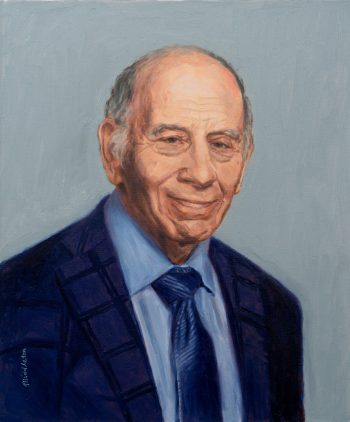Dr. Michael Eskin
- Canadian Agricultural Hall of Fame
- Inductees
- Dr. Michael Eskin

- Inducted: 2024
- Residing Province: Manitoba
- Gallery Location: 249
- Nominated By: University of Manitoba
Dr. Michael Eskin
- (1941
- -
- )
Canada’s canola industry owes much of its international success to the trailblazing research of Dr. Michael Eskin. A world-renowned food chemist, Michael’s life work at the University of Manitoba on canola oil – most notably its early development and refinement – successfully expanded the global market potential for this quintessential Canadian crop.
Michael joined the University of Manitoba in 1968 where he laid the groundwork for canola to become a world feed and food crop, unlocking its potential for Canadian farmers and the canola value chain. In a career than spans more than 50 years, he played a pivotal role in establishing canola oil as an important heart healthy addition to the diet, extending its benefits to include Canadian producers, consumers and the economy.
Early in his career, Michael collaborated with plant breeders to enhance the quality and stability of canola oil, a move that was critical to the successful development of the crop. He studied sensory qualities and the preservation of canola oil in food, emphasizing nutritional benefits and shelf-life characteristics that would see new low linolenic acid canola varieties with dramatically improved frying performance and stability. Michaeldemonstrated the health benefits of antioxidants and vitamins in canola seed, meal and oil to define its positive impact on human and animal nutrition. He also demonstrated that canola oil was safe for human consumption and contained heart-healthy omega-3 fatty acids. And in the late 1990s, his innovative approach to research solved the canola haze problem that threatened the very heart of the industry.
To promote the heart healthy story of the newly developed oil, Michael co-authored a booklet for the Canola Council of Canada on the science and technology of canola oil – including performance and nutritional properties– for health professionals and the food industry around the world.
Today, the Canadian canola industry and its economic impact were propelled by Michael’s lifetime of scientific achievements. Canola oil is the number one edible oil in Canada and accounts for more than 50% of vegetable oil consumed in Canada. Canola is the most profitable field crop in Canada, contributing $29 billion annually to the national economy. Canola is now ranked the third most consumed edible oil around the world.
A prolific writer, Michael is recognized globally as a leading food science writer with 17 books to his credit. He has guided countless students into the next generation of scientists as a cherished teacher and mentor, and continues to teach, research and write as a Distinguished Professor.
Throughout his career, Michael has received numerous awards including the American Oil Chemists’ Society Supelco Research Award, considered the world prize in lipids. His other honours include Member of the Order of Canada, Order of Manitoba, Fellow of the Royal Society of Canada and Manitoba Agricultural Hall of Fame.
An outstanding scientist, Dr. Michael Eskin set the course for canola to become a worldwide food and feed crop. His scientific discoveries transformed the economic powerhouse potential for canola, Canadian farmers and the Canadian agriculture industry.
L’industrie canadienne du canola doit une bonne part de son succès international aux recherches novatrices de Michael Eskin. Chimiste en alimentation de renommée mondiale, Michael a consacré sa carrière universitaire à l’huile de canola, en particulier à son développement et raffinement, contribuant ainsi à l’accroissement du potentiel commercial mondial de cette culture on ne peut plus canadienne.
Michael s’est joint à l’Université du Manitoba en 1968. Il y a jeté les bases qui ont permis au canola de devenir une culture vivrière à l’échelle mondiale, tout en en libérant le potentiel pour nos agriculteurs et notre chaîne de valeur. Au fil d’une carrière qui s’est échelonnée sur plus de 50 ans, il a joué un rôle clé dans l’établissement de l’huile de canola comme supplément diététique important pour la santé cardiovasculaire, étendant ses bienfaits aux producteurs, aux consommateurs et à l’économie du Canada.
Tôt dans sa carrière, Michael a collaboré avec les phyto–généticiens afin d’améliorer la qualité et la stabilité de l’huile de canola, chose qui a assuré le bon développement de cette culture. Il a étudié les caractéristiques sensorielles et la conservation de l’huile de canola dans les aliments, mettant l’accent sur les avantages du canola sur le plan de la nutrition et de laconservation en vue de créer de nouvelles variétés ayant une faible teneur en acide linolénique et une performance grandement améliorée en matière de friture et de stabilité. Michael a démontré les bienfaits pour la santé des antioxydants et des vitamines contenus dans les graines, la farine et l’huile de canola afin d’en définir l’impact positif sur la nutrition humaine et animale. Il a également démontré que l’huile de canola ne présente aucun danger pour la consommation humaineet contient des acides gras oméga 3 favorisant la santé cardiaque. Et, à la fin des années 1990, ses recherches novatrices ont permis de résoudre le problème de turbidité du canola qui menaçait l’existence même de l’industrie.
Michael a corédigé un livret pour le Conseil canadien du canola afin de promouvoir les avantages de cette nouvelle huile pour la santé cardiaque. Ce livret, destiné aux professionnels de la santé et à l’industrie alimentaire du monde entier, exposaitla science et la technologie derrière la production d’huile de canola, notamment en ce qui a trait à sa performance et à ses propriétés nutritionnelles.
Aujourd’hui, les réalisations scientifiques de Michael ont propulsé l’industrie canadienne du canola et l’impact économiquede cette culture. L’huile de canola est l’huile alimentaire numéro un au Canada et représente plus de 50 % de l’huile végétale consommée au pays. Le canola est la grande culture la plus rentable au Canada, contribuant 29 milliards de dollars par année à l’économie nationale. Le canola est maintenant classé comme la troisième huile comestible la plus consommée dans le monde.
Auteur prolifique, Michael est reconnu à l’échelle mondiale comme rédacteur de premier plan dans le domaine des sciences de l’alimentation, comptant 17 livres à son actif. En sa qualité d’éducateur et de mentor, il a guidé d’innombrables étudiants vers la prochaine génération de chercheurs et il continue d’enseigner, de faire de la recherche et d’écrire à titre de professeur distingué.
Au fil de sa carrière, il a reçu de nombreux prix dont l’American Oil Chemists’ Society Supelco Research Award, considéré comme le prix mondial des lipides. Il a également été nommé membre de l’Ordre du Canada, membre de l’Ordre du Manitoba, membre de la Société royale du Canada et membre du Manitoba Agricultural Hall of Fame.
Chercheur exceptionnel, Michael Eskin a tracé la voie qui a permis au canola de devenir une culture vivrière mondiale. Ses découvertes scientifiques ont multiplié le potentiel économique du canola, tant pour nos agriculteurs que pour notre industrie agricole.


